- About Us
- Columns
- Letters
- Cartoons
- The Udder Limits
- Archives
- Ezy Reading Archive
- 2024 Cud Archives
- 2023 Cud Archives
- 2022 Cud Archives
- 2021 Cud Archives
- 2020 Cud Archives
- 2015-2019
- 2010-2014
- 2004-2009
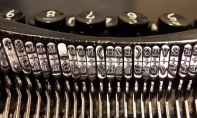 |
Cud Flashes In The Pan |
I like protagonists and antagonists. I like plots that are resolved, and with the protagonists’ participation. And I like to see protagonists who are different people at the end of their stories than they were at their beginnings. I don’t generally care for unexplained plots that wrap up just because, or the “deus ex machina” saving the day, or authors who make it all happen out of convenience or coincidence.
But since it’s The Cud’s January “All Things Lit” edition, I’ll ignore my preferences for this story. It’s longer than usual for this column, and while it has protagonists who participate in resolving the plot and who are different people at its end, the god definitely comes out of the machine to make this ludicrous plot happen, violating everything I stand for. But since I like the occasional exception that proves the rule, we’ll go with it.
"All the Difference"
Fantasy
By David M. Fitzpatrick
They were just driving around the back country roads, nothing more. They’d moved from the big city just two weeks before, Claire to focus on her paintings and sculptures and Keith to write poetry in the quiet serenity of the rural New England town, a good hour’s drive from the urban center of Evervale. They’d gotten in the gray sedan, he in his polo shirt and beige Dockers and she in a pretty white sundress decorated with pink and yellow flowers, and driven down the unknown roads.
It should have been that easy, but just a few miles into their jaunt, they spied a rickety old farm stand at the side of the road, next to a long-unused dirt road. Once upon a time, it probably had been a bustling agricultural center full of pumpkins and apples and green beans and flowers, but now it was falling apart, its windows long since boarded up and its roof mostly devoid of ancient wooden shingles.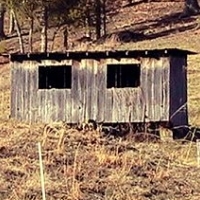
Keith snickered, gesturing at the farm stand. “Tacky. Is this the rural inspiration we were looking for?”
She giggled as Keith looked at the ramshackle structure. It leaned precariously to the left, as if beckoning Keith to the dirt road that led from the cracked asphalt and across a brief field. Grass grew in the road’s center, and even the worn tire ruts were mostly green. It vanished into a dark wood.
Keith wanted to explore the road, but Claire argued the idea. “We have no idea where it goes,” she said.
“That’s the point,” he said as they sat, engine idling, his foot on the brake. “That’s what this drive is all about—exploring what we don’t know.”
“I think we should explore the asphalt roads,” she said, pouting a bit. “That goes into the woods, and it’s dark in there. We could get lost on roads like that. Besides, you said the car’s pulling to the right and needs a front-end alignment.”
“Look, Claire, we moved here from the city for a reason,” he said. “We came here to get away from all the insanity and focus on our art. We came here to see the world in new and different ways, so I could write poems I’d never imagined writing, and you could paint pictures you’d never envisioned painting. What better way than to drive down the strangest route we could find, and see where it takes us?”
She looked dubious, so he let a smile creep across his face as he invoked the wisdom of a poet. “I’m thinking of Frost for this one,” he said.
She smiled lightly in response. “I see. The road less traveled?”
“It doesn’t get any less traveled than this,” he said, pointing at the dirt ribbon. “Besides, what else is there to inspire our artistic natures? The crappy old farm stand? I don’t know about you, but abandoned country farm stands are about as cliché and unexciting as they come for a poet.”
She turned her head, which was covered in a cascade of full, dark hair, and surveyed the mysterious path that snaked its way into the forest. When she turned back, her full lips were spread into a broad, peach-lipsticked smile. “Okay, let’s do it.”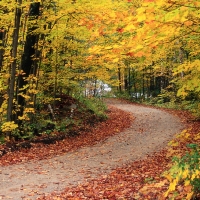
He let off the brake, spun the wheel, and swung the car onto the road. They drove past the ramshackle old farm stand, through the wildflower-filled field speckled with some random glacial boulders, and into the tunnel created by the evergreens and birches and other trees that grew there.
And that’s when the road they knew ended. As if a light switch had been thrown, everything went black and the car suddenly accelerated fast enough to throw them back against their seats. Claire yelped in surprise, arms flailing, and by the time Keith got his hands firmly back on the steering wheel, he realized they were doing exactly seventy miles per hour.
And before them, the woods road was gone. Instead, the vulcanized tires hummed on a glowing white road that seemed like something out of a video game. It was flecked with occasional sparkles, and it curved gently to the left and into the distance. All above was nothing but blackness; to the left and right, the faintest hints of glowing red-orange could be seen licking about the pale edges of the floating freeway. It was about twenty-five feet wide, giving him ample room to keep the car on a straight course.
“What the hell?” Keith hollered.
“What’s happened?” Claire screeched.
He checked his rearview, looking for the blue sky he knew should have been behind him. It wasn’t there. “I don’t know,” he said, pumping the brake. “But the brakes are out. And the car seems to be stuck at seventy.”
“Well, stop it!” she wailed.
“I just told you the brakes are out!” He stomped up and down on the pedal some more to make his point. Then he went for the gearshift and tried to force it out of gear. It wouldn’t budge. He put some muscle into it, gripping it tightly and trying like hell to force it to move. It wouldn’t. On a whim, he tried hauling it back into a lower gear. Same result. He felt panic sweeping through him.
The emergency brake. He reached down between them, grabbed it, and yanked it up. There was almost no resistance, and the car never slowed. It was like there had never been a way to brake the car at all—
“Look out!” she screamed.
The road, which had been curving gently to the left, suddenly veered the other way. He wildly jerked the wheel back, and the car wobbled to and fro as he worked to center it on the road.
“That was close,” he said.
“Stop the car!” Claire wailed.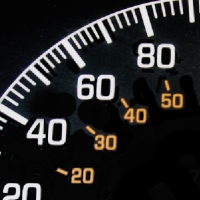
“I’m trying!”
He squinted ahead and saw the road: It stayed rightward for a bit, but in the distance he could see it curve back to the left… then right… and so on, off into the black distance. It was as unpredictable as it was bizarre. Keith knew he had to stop the car.
He grabbed for the key, tried to shut off the ignition or yank the key out, but everything was stuck in place. “What the hell is going on?” he cried. “It’s like someone has screwed up everything that can stop this car!”
Claire spun her head about, face pressed against the glass, looking out over the edge at the red-orange glow. “What’s down there?” she said, her voice quavering with fear. “And what is this place? How’d we get here?”
“How the hell should I know?” he hollered.
He glanced at her, feeling the sweat beading up on his forehead. She was as beautiful as she had been when they’d married. Her mane of curly hair was just as bouncy, her lips just as full. But worry creased her face in a dozen places, and with good reason.
“I’m sorry I yelled,” he said.
“It’s okay.” She paused a long time, staring straight ahead with hard eyes, and then said, “I told you we shouldn’t have gone down that road.”
“Don’t even start that! Nobody could see this coming. Fallen trees and wild bears and getting stuck in the mud—those are all things we could understand were the kinds of troubles we could get into. But this—this is some damn trip into the Twilight Zone! Glowing white roads in outer space? How could we have foreseen this?”
“I don’t think it’s outer space,” Claire said, sounding nervous. “There are no stars up there. And what’s the glow down there? Is it fire?”
Keith glanced to his left. The red-orange glow was ominous, but just barely flickering at the black edges of the obsidian road—as if what was down there were just beneath them. “I don’t know,” he finally said.
“So what do we do?”
“For now, we have no choice but to drive,” he said. “The car won’t stop, the accelerator’s stuck, I can’t shift it, and the key won’t shut off. So I’ll steer until we reach the end of whatever this is. Or we run out of gas.”
He kept his eyes on the road as its curved straightened briefly, then eased in the other direction.
* * *
They sped along the strange road in silence for about five minutes by the car’s clock, Keith occasionally correcting to follow the leisurely curves. It was then that he came to understand, with a sort of sick realization, what was happening with the road. He was considering whether to tell her or not, but Claire spoke up. “It’s getting narrower, isn’t it?” she said.
He sighed. He wasn’t going to lie to her. “Yes, gradually. I’d say by five feet in the past five minutes. If it keeps up… it will be too narrow in about fifteen minutes.”
“Please try the brake again,” she said.
“It won’t do any good.”
“Just try it.”
He held back another sigh and pressed the brake pedal all the way to the floor, and felt no resistance, as if the brake lines had been cut. “No use,” he said.
The luminous white road raced beneath them. If it weren’t for slightly off-white specks and occasional sparkles flying past them on the thing, he wouldn’t have known they were moving. There were no reference points in the utterly black sky—no stars, no clouds, nothing. Just a dark oblivion.
He checked the gas gauge. Half a tank. “Well, at least we won’t run out of gas before we run out of road,” he said, trying to cast a bit of dark humor on the situation. It was a poor attempt, and failed miserably; Claire put her head down and began to sob.
“All we did was go for a ride!” she cried. “I don’t want to die like this!”
He wasn’t ready to deal with her crying while he was racing to think of some way out of this. “We’re not going to die,” he snapped, even though he suspected they would. There was gravity in this place, and the car would eventually go over the edge. And the red-orange glow tickling the edges of the white road certainly seemed to indicate that something bad was to be found beneath them. Their only hope was that the wheels on both sides straddled the road at the precise moment it got too narrow—and that there wasn’t a bend in the road when that happened. Unlikely.
“We never should have turned onto this road,” she said. Eyeliner was streaming down her cheeks in tiny rivulets. She dug into her purse for a tissue.
He reached over and gently touched her leg. “Look, everything’s going to be fine. This road leads somewhere, and when we get there, we’ll know what this is all about.”
The red-orange at the edges of the road suddenly seemed to flare a bit brighter as the road continued to narrow. He turned his attention to driving, gripping the wheel tightly with both hands and keeping the speeding car straight and true.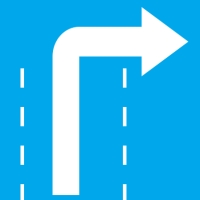
Keith checked his rearview mirror out of habit, but all he saw was the sparkling white road trailing behind like a white serpent. It was just them, the car, the white road, and the supernatural abyss. He suspected that they wouldn’t discover anything at the end of the road; it would just end, but not before it got too narrow and he lost control on a curve and the car plummeted into whatever hell was below.
* * *
They cruised along for several minutes. The road would be more or less straight for a time before suddenly curving in one direction or the other. Keith was increasingly aware of the narrowing of the road, and he gripped the wheel tighter as he worked to keep the car centered.
“It’s so stuffy in here,” Claire said. “I’m going to roll down the window.”
He nodded as she reached for the window button, and she was about to commence with that when he realized with horror what that could mean. He hollered at her, flailing over with his hand to grab her by her sundress and yank her back, and she yelped in surprise. The car swerved frighteningly, and he sat upright and gripped the wheel again. He played it, feeling that right-side pull of the front end, as the car swerved dangerously close to the edge of the road, and for a split second the red-orange glow greatly intensified as they almost skittered over the edge. Then, just as suddenly, the car was straightened out.
“Why the hell did you do that?” she screamed.
“We have no idea what’s out there!” he hollered.
“Oh,” she said.
He realized how silly it sounded. “Okay, wait. A car isn’t hermetically sealed, after all, so no poison gas has seeped in or anything. But that might be because we’re traveling as fast as we are, and it hasn’t been able to get in.”
She glowered at him. “So can I roll it down or not?”
“Slowly. And if you smell anything funny, roll it back up.”
She cracked the window slightly, and as soon as she did, he heard the sound of the tires on the white road. He’d been feeling it all along, but now he could hear them, and it sounded similar to the way they sounded rolling on asphalt, but not quite. Thankfully, there wasn’t any explosive decompression when she opened it. She stuck her nose up to the cracked window, sniffing. Then she announced, “It’s just air.”
She rolled the window down all the way. The stuffiness cleared up, so at least that was positive.
“I’m afraid,” she said after a bit.
He was, too, but all he managed was, “Yeah.”
He eased the car through a particularly tight curve before the road straightened out. It was still getting narrower, only now it seemed more desperate—as if the narrowing were happening a bit faster.
“We’re running out of road,” she said.
Keith thought madly. There had to be a way.
And then he realized there was only one way out of this. “We have to jump,” he said.
Claire was wiping her nose with her tear tissue, and looked up in surprise. “We can’t jump! We’ll be killed. We’re doing seventy!”
“We can survive it. We’ll wait until the next straightaway and go for it.”
She looked out her window, then turned back, eyes wide on her anxious face. “But how? There are only a few feet to either side. We’ll fall over the edge.”
He glanced out his window, and saw she was right. For the first time, he felt his palms beginning to sweat, and his grip on the wheel was suddenly greasy and precarious. This wasn’t what he’d expected at all. Nothing about this was giving him any new poetic insights.
“We’re going to go off the edge,” she said, her voice quavering. “There’s no way we can stop it.”
“Calm down and let me think,” he snapped.
But she had already turned away, sticking her head out the window, trying to see over the edge where the red-orange glow was slowly getting brighter. Her dark curls blew wildly about. “What’s down there? Do you think it’s Hell?”
“I said calm down,” he said through clenched teeth, but he was beginning to share her panic. She was right: They were going over the edge eventually, unless he thought of something. Maybe there was poetry in this—Dante’s Inferno-type poetry.
Then it hit him.
“We’ll go out through the trunk,” he said. “Fold down the back seat, pop the trunk, and hang off the back and slide. Go!”
“I’ll—I’ll try.”
She undid her seat belt and turned around. It was difficult in the dress; her cotton skirt buffeted his arm and shoulder as she clambered without much grace between the bucket seats. Once there, it was quick work to pop the seat free and lean it forward. There were some difficult moments as she got herself out of the way, folded the seat forward, and climbed on top of it.
“There’s a ton of junk in here,” she called back, her voice sounding as if from inside a tin can. “A spare tire, antifreeze, oil—”
“Just toss it all up front.” Outside, the edges of the glowing white road squeezed closer together with every revolution of the car’s spinning tires, even as the road went into a long, graceful curve. He tried the brake again, just in case, with the expected result. “And hurry.”
She worked quickly, moving the pile of trunk junk up front. Plastic bottles and oily rags vaulted over the seat. An empty brake-fluid bottle flew out the window and he saw it in the rearview mirror, bouncing on the glowing white road and then over the edge and into the abyss. He shuddered at the thought.
The last thing was the spare tire, which Claire hefted off to one side in the back, grunting as she did so. “I’m in!” she hollered. “How do I open the trunk?”
“I’m not sure. In the middle somewhere, where the lock is. Feel around for a way to release it.”
Keith focused on the road, stealing glances at the rearview mirror. All he could see was her ass, and the glimmering white road stretching away behind the car. He stole a look out the window. There were a few feet on either side—no room for error. He renewed his grip on the wheel, even as the road’s curve abruptly straightened. “Claire, we’re almost out of time.”
And just then, he heard the trunk pop. “I did it!” she cried. “Now we can—“
And in sudden stark silence, he realized what she was. Her dress rustled as she clambered around behind him, and felt the locks of her hair dust across his cheek as her head leaned over his seat.
“How are you going to jump? You can’t let go of the steering wheel, or the car will go over the edge.”
The logic problem overwhelmed his swimming brain, and he fought to think. “You’re going to have to jump without me.”
“No!” she cried, grabbing for his shoulder. “I won’t leave you!”
“Relax—I’ll be along. I’ll go out the window, and climb on top of the car.”
“Will that work?”
He focused down the nose of the car, saw the white road now narrowed to just two feet on either side of the car. “It’ll have to. Now, we’re about to run out of road, so get back there and jump before it curves again.”
“I don’t know if I can.”
“You don’t have a choice! Do it now, or we’re dead!”
She scrambled back into the trunk. In the rearview, he saw the trunk lift up as she pushed on it. “Hang on to the edge of the trunk, feet first,” he called. “Let the car drag you, and then let go.”
He watched the road ahead, which was straight for the moment. Claire got on her belly and stuck her feet out first. She inched quickly back until her shoes hit the road’s surface. It sounded not like rough asphalt but like smooth vinyl flooring.
In the distance, he could see the road heading left.
“Go now!” he screamed. His heart was pounding mercilessly in his chest now. A foot and a half to either side of the car. The road about to turn. It was now or never.
“I can’t!” she wailed.
“You have to!” he said, reaching for the window handle and quickly cranking it down. Wind buffeted his hair, and he had to yell over the noise. “The road’s about to turn, and we’re running out of width!”
Without further argument, she did. He heard the trunk slam shut, and saw in the rearview as she slid, losing speed behind him. No tumbling or bouncing, and no falling over the edge.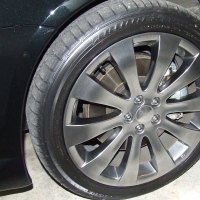
He looked back to the road as the leftward curve was upon him. There was almost no room left to play as he hugged the corner, which was sharp—and suddenly the road curved just as suddenly back to the right. He sucked in his breath as he countersteered. Somehow, he stayed on. The road then stopped curving and shot straight into the distance.
Now or never.
Keith seriously doubted he could let go of the wheel, climb out the window, get on the roof, and leap off the back before the car drifted one way or the other. Up and out the window, climb on the roof, slide back to the trunk, and off the back of the car. There was no way he could do it faster than seven or eight seconds. Maybe five or six if everything went flawlessly. And hadn’t he noticed the car had a bit of a pull to the right since moving to the country?
There was just a foot on either side of the car.
He moved the car dangerously close to the left side, riding that edge, and carefully relaxed his grip on the wheel until he was no longer in control.
The car drifted steadily to the right. He let it drift until it was at the other edge, and regained control.
Five seconds. He’d never make it. It would have to be much faster. And there was barely a foot left on either side. He was out of time. He had to move. No choice.
He edged the car back to the left, unbuckled his seat belt, reached down for the adjustment lever and slid the seat all the way back, so he wouldn’t bump the wheel with his knee. Then he took a deep breath and did it.
He was out the window and sitting on its edge inside of two seconds, even as the car drifted right. Even then, he glanced ahead and saw the road banking sharply to the right.
No time.
In an acrobatic move he didn’t think he could manage, he pulled himself up and rolled his body across the roof. He kept rolling down the rear window, across the trunk, and away.
It wasn’t as graceful as Claire’s escape had been. He hit the white road like a two-hundred-pound sack of potatoes and he bounced. The white-road world spun crazily; flashes of red-orange flew through his vision, flashes of the road, and flashes of the car speeding away from him. He stopped tumbling and slid, headfirst, and saw the car meet its fate.
The road was nearly too narrow at that point anyway, but when it angled abruptly right, it launched into the open space and barrel rolling—and then it was gone, vanished over the edge not so far ahead. He kept sliding for several more seconds, and for a moment he was sure he’d meet the curve and join the car, but he finally stopped a good fifty feet from the curve.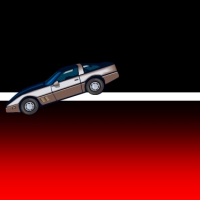
He ached all over, but didn’t seem to have suffered any road rash. He winced amidst dozens of different pains as he forced himself to his knees. But it was far too excruciating, overwhelming his brain and sucking the consciousness from him. The fiery-tinged white road faded to black.
* * *
He came to, and Claire’s face was over his. She was holding his hand.
“Are you okay?” she asked.
Everything hurt. “No, but I’m alive. You?”
“I’m fine.”
She was kneeling, and he realized most of the lower part of her dress had been shredded and torn away, leaving her in a tattered, mid-thigh skirt. She saw him noticing and said, “I ripped it off. I wanted to toss it over the edge and see what happened.”
His interest was kindled. He grimaced as he brought himself to his knees—made it this time—and crawled to the edge, just three feet away. He got there and peered over.
It was anticlimactic. The road was just a few inches thick, and far beneath it was the red-orange glow. It wasn’t fire; just a glow. There was no sense of depth; it could have been ten feet below, or maybe a hundred or a thousand. But it was brilliant—bright and powerful and otherworldly.
“What happened when you threw the dress down?”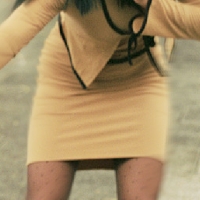
She had crawled over and was looking over the edge with him. Without a word, she reached down and deftly tore another strip of cloth off her ragged dress. Then she leaned over the edge and let it go. Keith watched in silence as it fluttered like a feather on the wind, falling forever into the red-orange glow, falling until it was a tiny speck, and then he couldn’t see it anymore.
He sighed, backing away from the edge and sitting on his butt. She joined him.
“How long since we first ended up on this white road?” he asked.
“I don’t know. I had to walk a while to get to you. Maybe forty-five minutes.”
“That’s what I thought. So it’s about fifty miles, give or take, back the way we came. But based on how narrow the road is, I’d say we’re closer to it its end.”
She blinked, clearly surprised. “You aren’t suggesting we keep going?”
“We turned down a road we’d never been on, and this is what it became. I’m the first to admit it’s completely bizarre. But it’s because of that, and because of all we’ve been through, that I guess I’d like to see where it ends up.”
For a moment, he thought she was actually going to protest, but she nodded. They got to their feet and began walking.
* * *
They walked for two hours, and the road narrowed all the while. He guessed they’d gone five or six miles when it was down to two feet wide.
“We have to stop,” Claire said from behind him. They were walking single-file out of necessity. “It’s getting too narrow. And it will just end up a foot wide, then six inches wide, and then three and two and one... we can’t keep walking.”
He slowed, came to a stop. He was about to concede her point, when he realized something in the distance gleamed blue. “Look at that, way ahead.”
She crowded up behind him, looked over his shoulder. She sucked in her breath, confirming he wasn’t seeing things. “What is it?”
“I don’t know, but it’s close. We have to check it out.”
“I’m scared to go any further.”
“Stay if you want. I’m going.” And with that, he trudged forward. Behind, he heard her reluctant feet fall into step.
The tiny blue flicker quickly grew larger, even as the white road slowly narrowed. By the time the blue appeared to be the size of a postage stamp, the road was perhaps fifteen inches wide. They both had their arms out now, adding balance to their trek.
“It looks like a door,” she said.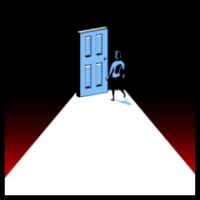
“It is,” he replied, excitement welling up within him. “Come on!”
He picked up the pace, albeit carefully, and they hurried ahead. The blue door grew before them, almost artificially so, and then they were there, the white road just a foot wide as it terminated at the door. It was a wooden door, wider than the road, painted blue, its edges glowing with the unmistakable illumination of daylight beyond.
There was a rusty latch on the door, hooked onto nothingness. He lifted it and pushed the door open to blue skies and green fields and fluffy clouds and chirping birds, and they stumbled out, tumbling to the ground in each other’s arms and laughing.
“We’re back where we started,” she said.
He sat up and stared. They had just exited the rickety old farm stand—the unpoetic cliché he’d snickered over—that they’d left when they’d first turned down the road. The stand’s door was open, bumping back and forth in the wind; inside, the white road stretched off in the distance.
“Close it,” she said. “I don’t want to see that thing anymore.”
He couldn’t have agreed more. He got up, limped to it, and swung it closed. It banged shut, and the metal latch clattered into place. He turned back to her, but then a thought struck him. He turned to the door, reached out, opened it.
It was the interior of the rickety old farm stand, nothing more.
“Wow,” he said under his breath. He turned, looking at the dirt road that ran through the wildflowers in the field and vanished into the dark forest. “I wonder what happens if we go down the road again.”
“You can’t be serious,” she said.
He spun back, smiling. “I bet it’s just a road now. But we can try it another day—you know, on bicycles, or on foot.”
“Or never again.”
“Where’s the fun in that?”
She glared up at him from the grass. “I’ve had enough fun to last a lifetime.”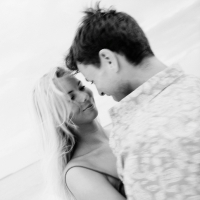
His mind raced with rampant enthusiasm. “Just think how this has changed us, Claire—how it will keep changing us. We’ve seen things nobody should ever have seen. I’ll never write poetry the same way again, I can tell you. My view of reality now is different than I could ever have imagined before. Tell me your paintings won’t be different now, your sculptures something new, after what you’ve seen.”
He could see it in her face, the wonderment and awe, but she seemed reluctant to admit it. “Let’s not forget Frost,” he said. “‘I shall be telling this with a sigh, somewhere ages and ages hence: Two roads diverged in a wood and I—I took the one less traveled by. And that has made all the difference.’”
She laughed, coming to her feet. “I guess I can’t argue that point. You’re right; everything has changed for me. But as for traveling that road again—maybe another day.”
They headed off toward home, but he was thinking about all the roads he’d never traveled. Especially the ones he couldn’t even begin to imagine.
David M. Fitzpatrick is a fiction writer in Maine, USA. His many short stories have appeared in print magazines and anthologies around the world. He writes for a newspaper, writes fiction, edits anthologies, and teaches creative writing. Visit him at www.fitz42.net/writer to learn more.
